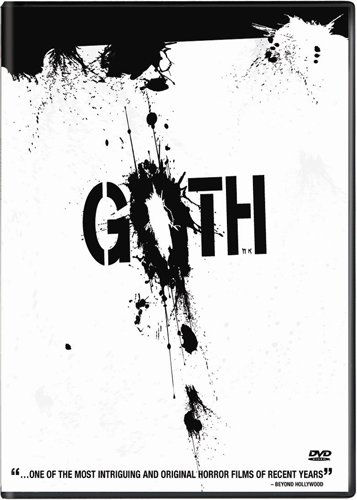
On a sunny, nondescript day, a woman's body is found propped up in a public park and her left hand completely severed. As another corpse was found in a similar state months prior, the police ponder the possibility of a serial killer, though they're not the only ones following the case. A fascination with all things morbid has brought together two teenagers from otherwise different background: Morino (Rin Takanashi), who's since given into her outcast status, and Kamiyama (Kanata Hongo), a cheery kid who harbors a secret obsession with death. Once they catch wind of the murders, the teens team up to track down the culprit and uncover his true motives. But when they stumble upon the killer's own journal, Morino and Kamiyama are forced to choose between going to the authorities or risk allowing potential deaths for the sake of understanding their own wounded psyches.
As in real life, it's hard to distinguish true adolescent angst from abject whining. But Goth isn't here to dissect subcultures; it's just a moody mystery, which is all jake with me. Hell, it doesn't even seem overtly mopey -- until you realize it's precisely that, just not from an aural standpoint. As Goth's characters suffer in silence, so does the viewer, who bears witness to a 96-minute pout-off that probably could've taken half an hour if its leads got the anchors out of their pants. This movie buys its dramatic pauses from the same Sam's Club as the Twilight franchise, and it's even more cavalier about using them to create the illusion that, no really, we're totally sad, you guys. There's feeling numb towards the world, and then there's catatonia, and from how blase Morino and Kamiyama react to the horrors they encounter, one wonders behind what plants their life support machines are tucked.
But as much as I'd love to fully condemn Goth as emo twaddle, here's where I have to pump the brakes. I hate to say it, but Goth isn't altogether uninteresting; the false emotions stem more from a director who's allergic to editing than from a flawed story. There are times when the plot is quite absorbing and not prone to beating us over the head as high school melodramas have before. For the most part, the sadness Morino and Kamiyama feel is genuine; it never seems like a vapid call for attention, and in Morino's case, it's even a form of penance. Kamiyama isn't as well-defined, but I dig the idea of a social butterfly hiding his dark side with disturbing ease. But again, their nonchalant nature returns to bite them in the aft end, sapping all the oomph from erstwhile challenging scenes, such as when Morino dresses as a murder victim to feel the sensation of being stalked. The climax is its own beast, one that bum-rushes story threads it should be resolving and prolonging ones that beg for the Old Yeller treatment.
A few years back, the Pang Brothers, those masters of inconsistency, made a minor masterpiece about dwelling on death. The film is called Ab-Normal Beauty, and it's a lurid, seedy, and whip-smart riff on everything Goth tries to do. Respectable as the filmmakers are towards characters often thrown to the stereotype wolves, real insight is in short supply, while the greatest terror comes from realizing you put money towards something scraped off the side of J-horror's aquarium.


No comments:
Post a Comment